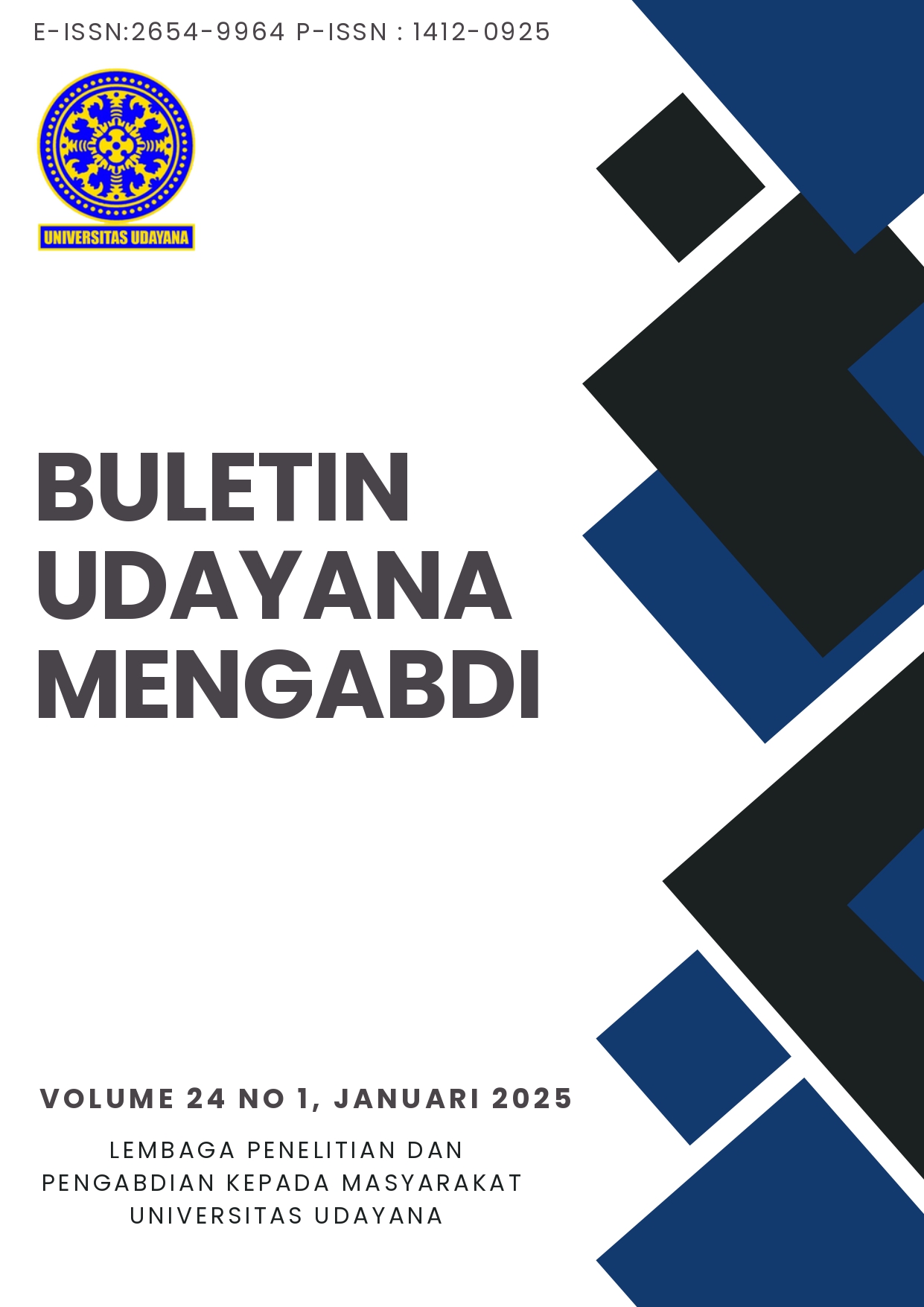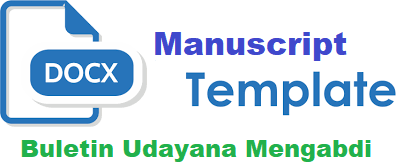PENGARUH EDUKASI PERSIAPAN MENYUSUI TERHADAP PENGETAHUAN KADER POSYANDU TENTANG ASI EKSKLUSIF
Abstract
This activity aims to increase the knowledge of posyandu cadres in assisting pregnant and breastfeeding mothers to provide exclusive breastfeeding in Peguyangan Kaja Village, North Denpasar. The method used was providing education with lectures and breastfeeding simulations (the first 1000 days of life, the meaning of exclusive breastfeeding, how to breastfeed, problems that often occur during breastfeeding and their solutions, correct breastfeeding practices, and assessing the adequacy of breast milk for babies) to 25 people Posyandu cadres. The results of the Wilcoxon Signed Rank Tests showed a significant change in the knowledge of posyandu cadres before and after being given the intervention (p < 0.005). These results indicate that there is an influence of the education provided on the level of knowledge of posyandu cadres. Education through simple lectures and simulation activities can be used to increase the knowledge and understanding of posyandu cadres in carrying out their duties, such as assisting pregnant and breastfeeding mothers, providing information, motivation and support to provide exclusive breastfeeding, so that babies get the best nutrition for their growth and development.
Keywords: exclusive breastfeeding, cadres, education, simulation
Downloads
References
Jones, S. P., Jenkinson, A. J., Leathley, M. J., & Watkins, C. L. (2009). Stroke knowledge and awareness: An integrative review of the evidence. Age and Ageing, 39(1), 11–22. https://doi.org/10.1093/ageing/afp196
Kemenkes RI. (2022). Profil Kesehatan Indonesia (F. Sibuea, B. Hardhana, & W. Widiantini (eds.)). Kementerian Kesehatan Republik Indonesia.
Kemenkes RI. (2014). Permenkes RI No.25 tahun 2014.
Kemenkes RI. (2022). Laporan Kinerja Kementerian Kesehatan. In Kementrian Kesehatan RI.
Kundre, R., & Mulyadi. (2018). Pengaruh pendidikan kesehatan dan simulasi terhadap pengetahuan dan keterampilan pertolongan pertama pada siswa yang mengalami sinkop di SMA 7 Manado. Jurnal Keperawatan, 6(2), 9–10.
Notoatmodjo, S. (2007). Promosi kesehatan dan ilmu perilaku. Rineka Cipta.
Nurbaya, Saeni, R. H., & Irwan, Z. (2022). Peningkatan pengetahuan dan keterampilan kader posyandu dalam memperbanyak produksi ASI melalui teknik Swedish Massage. Jurnal Masyarakat Mandiri, 6(1), 29–37. https://doi.org/10.52657/bagimunegeri.v6i1.1721
Profita, A. C. (2018). Beberapa faktor yang berhubungan dengan keaktifan kader Posyandu di desa Pengadegan kabupaten Banyumas. Jurnal Administrasi Kesehatan Indonesia, 6(2), 68. https://doi.org/10.20473/jaki.v6i2.2018.68-74
Riauwi, H. M., Hasneli, Y., & Lestari, W. (2014). Efektivitas pendidikan kesehatan dengan penerapan the health belief model terhadap pengetahuan keluarga tentang diare. JOM PSIK, 2(1), 1–9.
Sahmad. (2015). Potensi peran keluarga dalam perawatan penyakit stroke melalui pengembangan model discharge planning berbasis teknologi informasi BERBASIS TEKNOLOGI INFORMASI Family Potency Role in the Stroke Care by Developing Discharge Planning Model Based on Informati. Jurnal MKMI, 1(1), 154–159.
Solehati, T., Sari, C. W. M., Lukman, M., & Kosasih, C. E. (2018). Pengaruh pendidikan kesehatan terhadap pengetahuan deteksi dini dan pencegahan anemia dalamuUpaya menurunkan AKI pada kader Posyandu. Jurnal Keperawatan Komprehensif (Comprehensive Nursing Journal), 4(1), 7–12. https://doi.org/10.33755/jkk.v4i1.75

This work is licensed under a Creative Commons Attribution-ShareAlike 4.0 International License.

This work is licensed under a Creative Commons Attribution-ShareAlike 4.0 International License.




.png)


1.png) GARUDA - GARBA RUJUKAN DIGITAL
GARUDA - GARBA RUJUKAN DIGITAL



